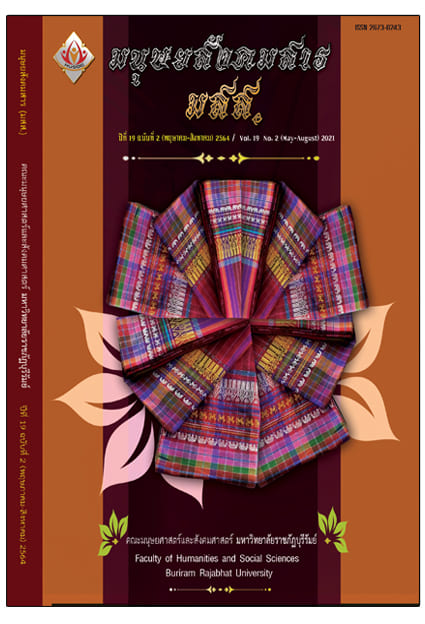คุณลักษณะผู้นำกับการจัดการความขัดแย้ง
Main Article Content
บทคัดย่อ
องค์กรจะประสบความสำเร็จหรือล้มเหลวในการดําเนินงานนั้น ปัจจัยสำคัญที่สุดก็คือผู้นํา ในองค์กรย่อมมีความขัดแย้งเกิดขึ้นได้เสมอ ซึ่งความขัดแย้งด้านต่าง ๆ จำเป็นต้องได้รับการจัดการ เพื่อให้องค์กรสามารถดำเนินงานได้อย่างมีประสิทธิภาพ การวิจัยครั้งนี้จึงมีวัตถุประสงค์ เพื่อศึกษาคุณลักษณะผู้นำกับการจัดการความขัดแย้ง และเพื่อศึกษาปัจจัยคุณลักษณะผู้นำที่มีอิทธิผลต่อการจัดการความขัดแย้ง ผู้วิจัยดำเนินการวิจัยโดยใช้การศึกษาวิจัยเชิงปริมาณ ใช้แบบสอบถามเป็นเครื่องมือในการเก็บรวบรวมข้อมูลจากผู้นำองค์กรธุรกิจ จำนวน 400 คน ซึ่งใช้วิธีการวิเคราะห์ความสัมพันธ์ของปัจจัยที่มีอิทธิผลต่อการจัดการความขัดแย้ง สถิติที่ใช้ในการวิเคราะห์ข้อมูล ได้แก่ การแจกแจงความถี่ การหาค่าเฉลี่ย ค่าร้อยละ และการวิเคราะห์โมเดลสมการโครงสร้าง ผลการวิจัยพบว่า การวิเคราะห์โมเดลสมการโครงสร้างด้านอิทธิพลเส้นทาง อิทธิพลทางตรง พบว่า รูปแบบการจัดการความขัดแย้ง ส่งผลต่อการจัดการความขัดแย้งในทางตรง อิทธิพลทางอ้อม พบว่า คุณลักษณะผู้นำ และรูปแบบการยอมให้ ส่งผลต่อการจัดการความขัดแย้งในทางอ้อม อิทธิพลทางตรงและอิทธิพลทางอ้อม พบว่า รูปแบบการยอมให้ ส่งผลต่อการจัดการความขัดแย้งในทางตรงและทางอ้อม
Article Details

อนุญาตภายใต้เงื่อนไข Creative Commons Attribution-NonCommercial 4.0 International License.
เนื้อหาและข้อมูลในบทความที่ลงตีพิมพ์ในวารสารทดสอบระบบ ThaiJo2 ถือเป็นข้อคิดเห็นและความรับผิดชอบของผู้เขียนบทความโดยตรงซึ่งกองบรรณาธิการวารสาร ไม่จำเป็นต้องเห็นด้วย หรือร่วมรับผิดชอบใดๆ
บทความ ข้อมูล เนื้อหา รูปภาพ ฯลฯ ที่ได้รับการตีพิมพ์ในวารสารทดสอบระบบ ThaiJo2 ถือเป็นลิขสิทธิ์ของวารสารทดสอบระบบ ThaiJo2 หากบุคคลหรือหน่วยงานใดต้องการนำทั้งหมดหรือส่วนหนึ่งส่วนใดไปเผยแพร่ต่อหรือเพื่อกระทำการใดๆ จะต้องได้รับอนุญาตเป็นลายลักอักษรจากวารสารทดสอบระบบ ThaiJo2 ก่อนเท่านั้น
เอกสารอ้างอิง
Bear, J. B., Weingart, L. R. & Todorova, G. (2014). Gender and the emotional experience of relationship conflict: The differential effects of avoidant conflict management. Negotiation and Conflict Management Research, 7(1), 213-231.
Chienwattanasook, K. (2010). The Impact of Employees’ Conflict Management Styles on Task Conflict, Relationship Conflict and Stress in the Thai Telecommunications Sector. Journal of Behavioral Science, 16(2), 13-31. [in Thai]
Hoonakker P. Marian A. & Carayon P. (2003). The relation between job characteristics and quality of working life : The role of tadk identity to explain gender and job type differences. Proceedings of the Human Factors and Ergonomics Society 48th Annual Meeting, New Orleans, Louisian, 351-367.
Kimencu. (2011). Leadership orientations and conflict management styles of academic deans in masters degree institutions. Ph.D. Dissertation. The West Virginia University.
Krackhardt, D., Lave, J., Arnold, R., Yealy, D. & Salas, E. (2012). Measuring teamwork and conflict among emergency medical technician personnel. Prehospital Emergency Care. 16: 98-108.
Lolly Daskal. (2014). “Testing hypotheses of entrepreneurial characteristics: A study of Hong Kong MBA students.” Journal of Management of Psychology, 11(3), 12-25.
Monataraphadung, S. (2016). “Creative conflict management” Journal Valaya Alongkorn Review (Humanities and Social Science), 6(2), 193-208. [in Thai]
Prasitratthasin. S. (2003). Multivariate techniques for social and behavioral sciences research: principles, methods and applications. Bangkok: National Institute of Development Administration. Liangchiang business site. [in Thai]
Prietula, M. J. & Weingart, L. R. (2011). Negotiation offers and the search for agreement. Negotiation and conflict management research. 4: 77-109.
Suksawang, P. (2014). The basics of structural equation modeling. Princess of Naradhiwas University Journal, 6(2), 136-145. [in Thai]
Thomas, K. W. & Kilmann, R. H. (1987). Thomas-Kilmann conflict model interest. New York, NY: X/COM Incoporated.
Todorova, G., Bear, J. & Weingart, L. R. (2014). Can conflict be energizing? A study of task conflict, positive emotions, and job satisfaction. Journal of Applied Psychology, 9(9), 451-467.
Vanichbuncha, K. (2011). Statistics for research. 6thed. Bangkok: Dusit Thani College. [in Thai]
Wonguparaj, N. (2012). The leadership style and conflict management of school administrators under the secondary educational service area office, Bangkok. A Thesis Submitted in Partlal Fulfillment of The Requirements for The Degree of Doctor of Philosophy Program. In Educational Administration Graduate College of Management Sripatum University. [in Thai]
Wongwanich, B & Laohavichien, T. (2019). Relationship between conflict management and organizational citizen behavior of Rojana Industrial Park workers in Ayutthaya province. Journal of RMUTSB Acad. J. (Humanities and social sciences), 4(1), 12-22. [in Thai]


